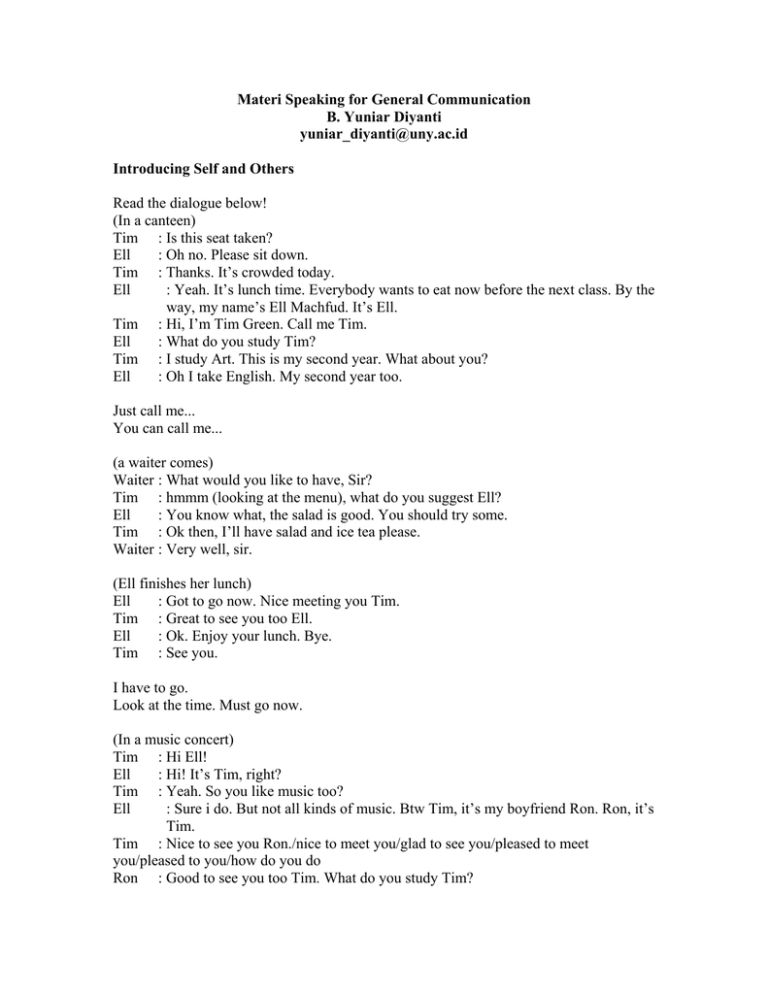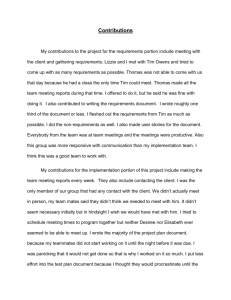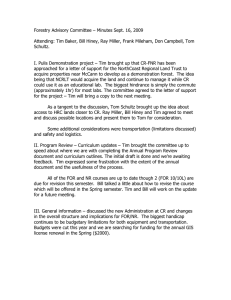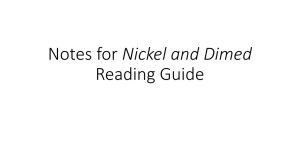Materi Speaking for General Communication B. Yuniar Diyanti Introducing Self and Others
advertisement

Materi Speaking for General Communication B. Yuniar Diyanti yuniar_diyanti@uny.ac.id Introducing Self and Others Read the dialogue below! (In a canteen) Tim : Is this seat taken? Ell : Oh no. Please sit down. Tim : Thanks. It’s crowded today. Ell : Yeah. It’s lunch time. Everybody wants to eat now before the next class. By the way, my name’s Ell Machfud. It’s Ell. Tim : Hi, I’m Tim Green. Call me Tim. Ell : What do you study Tim? Tim : I study Art. This is my second year. What about you? Ell : Oh I take English. My second year too. Just call me... You can call me... (a waiter comes) Waiter : What would you like to have, Sir? Tim : hmmm (looking at the menu), what do you suggest Ell? Ell : You know what, the salad is good. You should try some. Tim : Ok then, I’ll have salad and ice tea please. Waiter : Very well, sir. (Ell finishes her lunch) Ell : Got to go now. Nice meeting you Tim. Tim : Great to see you too Ell. Ell : Ok. Enjoy your lunch. Bye. Tim : See you. I have to go. Look at the time. Must go now. (In a music concert) Tim : Hi Ell! Ell : Hi! It’s Tim, right? Tim : Yeah. So you like music too? Ell : Sure i do. But not all kinds of music. Btw Tim, it’s my boyfriend Ron. Ron, it’s Tim. Tim : Nice to see you Ron./nice to meet you/glad to see you/pleased to meet you/pleased to you/how do you do Ron : Good to see you too Tim. What do you study Tim? Tim Ron Tim Ron Tim : I study art. How about you? : Really? Well how come we’ve never met before? I’m a lecturer at the art department. : Well i don’t study here. I study in other university. : Which university do you go? : You know what, I think I saw my friends over there. Got to go and greet them. Bye Ron, good talking to you. See you Ell. My friends are expecting me there. Waiting for Catch you later. Greeting: Hi/Hello! inf Good morning/afternoon/evening! formal and common Good day! How are you? How’s life? Inf What’s up? inf Howdy? inf How’s it going? inf How are you doing? Inf Responses: • Not bad. • Great • Wonderful • Very well/well • Nice • Fine • Good • Awesome • Not so good. • Not good • So so • So bad • Terrible/horrible • Perfect Informal greetings: Person you talk to friends, family Type of relationship Situation academic Addresing: Ma’am, Sir, Darling, Honey (hon), guys, pals, mates, friends, brothers (bros), sisters (sist), Mom, Dad, name How’s your day? How do you do? Parting: Good night! Introducing yourself Good morning/Hello/Hi, my name’s …. Hi, I’m … Let me introduce my self (to you), I’m/my name’s… (Just) call me… You can call me… Nice to meet you. Nice to see you. Good to see you. Nice meeting you. Nice talking to you. Introducing Other (Norman) Meet my friend, (she’s) Nadia. Nadia-norman Nickname Call name (namecall) Hello, what’s your name? She’s from Australia. really? Oh, really? I came from I come from Gesture… Asking questions: directly, indirectly Do you know …../Do you happen to know…./I wonder if you knew…/I wonder..../I’m curious of…. Could you tell me…. what his name is? What is his name? what the movie is about? What is the movie about? where my phone is? Where is my phone? who his girlfriend is? where her girlfriend studies? where he lives? where I can send this package? Do you know …../Do you happen to know…./I wonder if you knew…/I’m curious of…. 1. 2. 3. 4. 5. 6. Name-killer-in the novel The victim – in the drama series Play as batman-in batman begins Name – rector – uny Title – 3rd twilight Name – Kirsten Stewart’s boyfriend 7. Address – YSU 8. Name-the boy – the movie Up 9. Name – teach – structure 1 – lecturer 10. Name – EDSA chief – now 11. Name – vice dean 3 – FBS 12. the casts-Sherlock Holmes movie 13. the class chief-class HI 14. dean – faculty of Engineering 15. chief – SALC 16. location – SALC 17. subject – after speaking 18. time – extra class – speaking 19. hometown – Fauzan 20. enemy – Dracula – Twilight 21. famous novel – andrea hirata 22. the superheroes – The Avengers – Movie 23. the director – name - Mind your Language 24. name – the striker – U19 team 25. name –famous beach – in Gunung Kidul 26. No Questions Making Questions 2 types: 1. yes/no questions 2. w & h questions information Yes/no questions: Do/does/did Do you want to be my girlfriend? Do you speak english? Do you want money? Do you know my name? Do you love me? Does she look like me? Does everybody gossip? Does he wear jacket? Does she go to Happy Puppy every weekends? Did you sleep well last night? Did you watch the football game last night? Did my cat attack you? Did they come to my party? Did I look handsome? Is/are/am/was/were Is Turkey worth visiting? Are we going now? Am I wrong? Was the movie scary? Were the guests happy? Have/has/had… Have you finished your homework? Friends Have you been to Bondowoso? Have you arrived yet? Can/will/shall/may/must… Can I ask you something? Will the game be held soon? Shall we get an ice cream? May I borrow your novel? Must I do my homework? Should I do my homework? w/h q: what why who when where with / to whom whose which how What do/did/does/are/is/was/were Stating/enquiring whether one remembers or has forgotten a person, things or fact or action Stating whether one remembers or has forgotten a person, things or fact or action: – I (don’t/can’t) remember + VP gerund + wh clause + complement clause + NP – I haven’t forgotten + to + VPinf + NP + VP gerund + wh clause – I forget Enquiring whether someone remembers or has forgotten a person, thing, fact or action: – Do(n’t) you remember? – Have you remembered? + to + VPinf + NP – Do(n’t) you remember? +VP gerund + complement clause + wh clause) + NP Activity 1: 1. Show one of your belongings to your friend 2. ask your friend to observe the details of the thing 4. ask your friend of the details of the thing (color, shape, pattern, picture, writings, etc) 3. keep the thing out of sight Activity 2: 1. tell your friend the description of one of your family members (name, age, physical 2. after finishing the description, ask your friend whether he/she remembers this person appearance, habits, behavior, others) What is a complement clause? 0B Definition A complement clause is a notional sentence or predication that is an argument of a predicate. Discussion The term complement clause is extended by some analysts to include clauses selected by nouns or adjectives. Examples: I heard the evidence that he did it. I am sure that he did it. I am not certain what we did. Examples • We thought that you were coming. • For you to come would be a mistake. • I wonder whether you are coming. Nonexamples • Elsie fled to escape the hurricane. (a purpose clause that is not an argument of a predicate) • Milton came on stage juggling balls. (a manner clause that is not an argument of a predicate) • The mouse ate the cheese that was laying out. (a relative clause that modifies a noun and is not itself an argument of a predicate) • The plumber arrived who we had called earlier. (who we had called earlier is a relative clause—see the discussion) Discussion Relative clauses are not complement clauses. Relative clauses modify a noun phrase, whereas complement clauses are arguments which are selected by a verb, noun, or adjective. In some languages, relative clauses have a gap--a missing NP argument--which is understood to refer to the NP that the relative clause modifies. For instance, in "the person that saw you," the subject of the clause "saw you" is missing, but is understood to be "the person" that the NP as a whole refers to. Complement clauses do not usually have such a gap. For instance, in "the fact that he saw you," the clause "he saw you" does not have any missing arguments. This distinction, however, cannot be used in languages in which it is possible to omit the subject or other clausal arguments freely. This distinction is also not useful in languages which have internally headed relative clauses. Adverbial clauses are also not complement clauses. Adverbial clauses may modify any verb phrase or sentence, provided they fit semantically, and fill the same role that a purpose, manner, locative or temporal adverb would fill; whereas complement clauses are specifically selected as complements (arguments) by verbs, adjectives or nouns. Generic A complement clause is a kind of • What is a nominal clause? Analytic Rubric for Speaking Tasks Task Completion Minimal attempt to complete the task and/or responses frequently inappropriate Partial completion of the task, responses mostly appropriate yet undeveloped Completion of the task, responses appropriately and adequately developed Superior completion of the task, responds with elaboration Scoring Subjects Comprehensibility Fluency Responses barely Speech halting comprehensible and uneven with long pauses and/or incomplete thoughts Responses mostly Speech slow comprehensible, and/or with requiring frequent pauses, interpretation by the few or no listener incomplete thoughts Responses Some hesitation comprehensible, but manages to requiring minimal continue and interpretation complete thoughts Responses readily Speech comprehensible continuous with little stumbling Pronunciation Frequent errors, little or no communication Vocabulary Inadequate and/or inaccurate use of vocabulary Occasional problems with communication Somewhat inadequate and/or inaccurate use of vocabulary Adequate and accurate use of vocabulary Rich use of vocabulary with frequent attempts at elaboration No interference with communication Communication with ease Score 1 2 3 4 What are the words that best describe the experiences gained by non-English adult speakers when they learn English? Funny? Confusing? Irritating? Misunderstanding? Embarrassing? Interesting? Uncertain? …what else? Watch this youtube video, go to this address: https://www.youtube.com/watch?v=MApatYdSxO8&index=1&list=PLxRxwnkeaHZv5J EKUyrQFPQbVuGVvo6hh Please remember the name of each person in the movie; where each person is from; and identify at least 10 statements in the dialog that were confused and funny and tell why they are funny. Say also what you think of the video and whether you can understand the story or not. You can go to work in SALC or in the class. Submit your individual written report to my mail yuniardiyanti@yahoo.com as attachment form, tomorrow morning the latest. Make sure you write your name and your student number. Thank you, B. Yuniar Diyanti After you watch, please do the following exercises: 1. List as many names as you can hear from this episode. 2. List the funny expressions and state why you think they are funny. 3.




